Opinion: We should all be in search of new hobbies
Non-electronic hobbies and board games give a new way to socialize during quarantine.
Board game club attendees play a game at Hobby Corner located in the Sycamore Mall on Thursday, June 6, 2019.
May 13, 2020
Like any Generation Z, or Millennial — I was born in 2000, so I branch that weird gap between the two — I am glued to either my smartphone, laptop, or gaming controller. Yes, I will proclaim to the stereotype that I am connected to electronics. I even listen to audiobooks or read from my kindle — I used to only read books growing up!
But now as I watch my little sister grow up during her electronic-drenched childhood and as I reflect on my own childhood, I realize that if the wi-fi failed, or electronics went away for the day, both she and I would be struggling to find ways to entertain ourselves.
While I may sound like your grandmother, hunched over my never-ending crochet blanket, I am here to tell you to get a dang hobby. Something that requires little to no electronics. No, it does not have to be a physical activity. I am not actively inclined and I do not want to force you into something that involves sweating and other competitors.
I am talking about fine-motor hobbies like knitting, making friendship bracelets, reading, writing, even puzzles.
Needlework has been proven, reported by the New York Times, “to induce a relaxed state like that associated with meditation and yoga. . .knitting and crocheting can lower heart rate and blood pressure and reduce harmful blood levels of the stress hormone cortisol”. USA Today found that adults who played with puzzles had improved memory, better problem-solving skills, and delayed dementia and Alzheimer’s.
I started making friendship bracelets when I went to summer camps. I would do them once in a while when school started up when I was in middle school and high school, but I would soon lose interest when I had access to my electronics.
Even so, the scattered friendship bracelet making did not fill my time as much as I would have liked. I could read, or write. But between my writing assignments and the daily chapters I had to read for classes, I no longer found pleasure in the activities.
It was not until my Dungeons and Dragons group started playing board games while we waited for other members to arrive at the meeting spot. Soon, one game turned into two, which turned into board game nights every other week, while we had our adventure on the opposite Wednesday nights.
I should have known board games would become a staple in my life. One of my older brothers, James, worked at a local game store, Pegasus Games back in Wisconsin for as long as I can remember, before moving onto Noble Knight, each store was filled with games of all kinds. Growing up, I also got to know the owner of Pegasus Games, Lory Aitken, who worked there as the owner/boss for over forty years before selling.
Deciding it was best to consult the gameboard experts in my life, I interviewed the two — James over Zoom, and Lory over email — about how to cope with COVID-19 with the help of board games.
James replied, “there is a huge proponent of learning through play—tabletop games are a fantastic way to learn skills.” He recommends new players start with “party games. It is a broad category. The social aspect is more important than the mechanics. Figure out what part of it you enjoy and find more.”
Lory took her own approach in the email, writing, “Board games are a fabulous way to socialize with people while having a story, of sorts, for everyone to focus on. This can be a great ice-breaker for new acquaintances and a familiar pattern for gaming buddies.” For new board game enthusiasts, she recommended “Once Upon A Time, Bananagrams, Roll for It, Yahtzee, Yamslam, Catan, and Carcassonne.”
In the end, for finding a non-electronic hobby during COVID-19, there are many to choose from. You just need to have the patience to try all of them.



